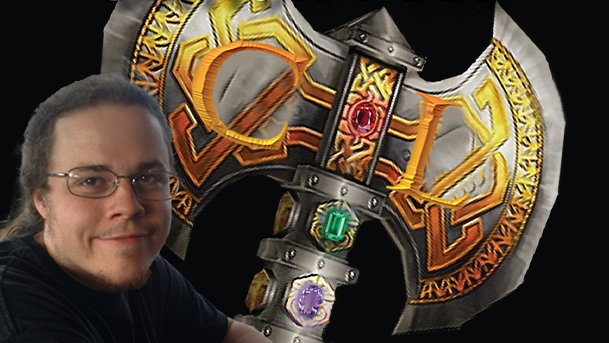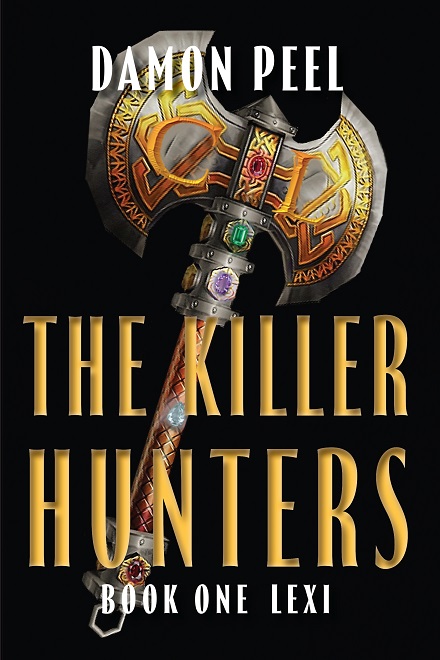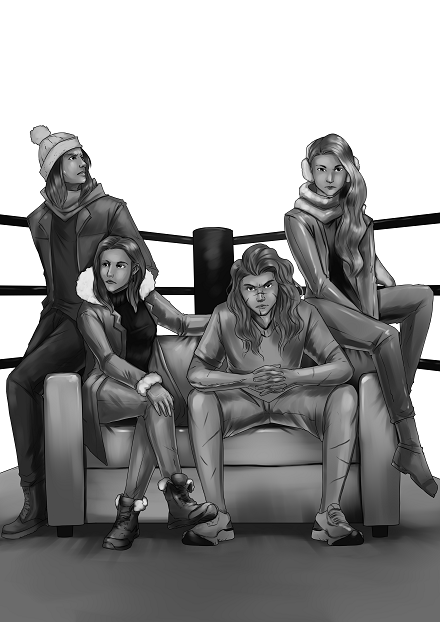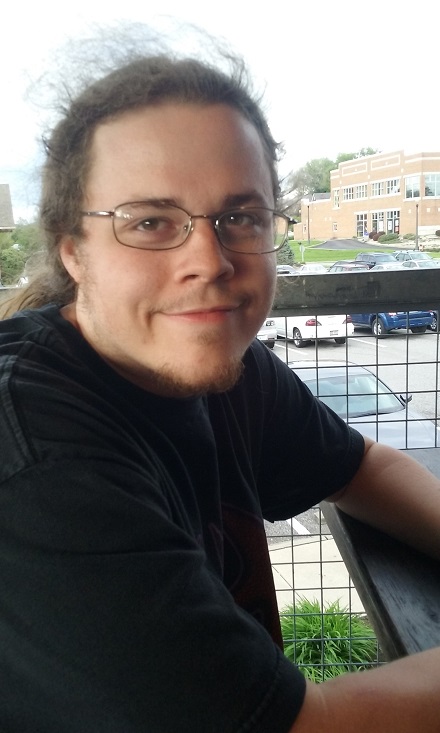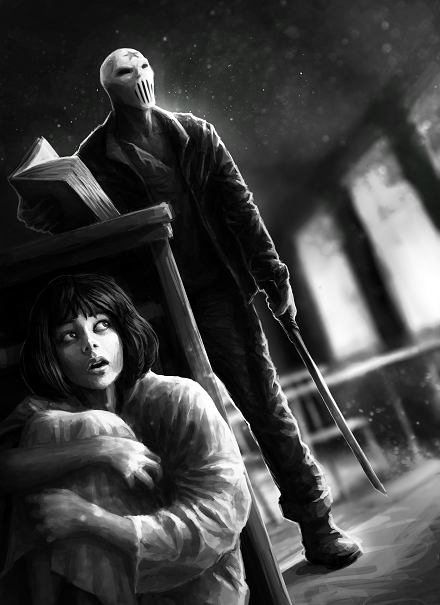Recently, Tellest promoted a story called The Killer Hunters, a horror slash urban fantasy that flips the script on your typical slasher stories. Today, we get to chat with the author of the interesting tale, see what he’s got on his plate, and what might be coming next. Read on to learn more about Damon Peel.
Tellest: Hello Damon! I wanted to thank you for taking some time to work with me on this interview. I know that you’ve got a lot of work and hobbies that take up your day, so being able to talk to you about your storytelling is a great opportunity. Now I’d like to try and pull back the curtain, so to speak, to let readers learn a bit more about you.
Damon Peel: Thank you for taking the time to interview me and take an interest in my story. I can’t wait to pull back the curtains and let people see more about me and the story I am trying to tell.
T: Early on in each of these interviews, I like to ask about inspirations and motivations. I find that they help readers learn more about their new favorite author. So, what started you down this path? Did you have an author that you favored, or a love for a certain genre of stories or other media that gave you the writing bug?
DP: I have always had a love of horror stories, be it movies or books. One of my favorite authors is of course the king of horror himself, Stephen King. My love of horror also spread into the games I would play with my friends. I remember when I was young, my mom would dress up like Jason with a glow in the dark plastic machete and my friend and I would go and hide, and she would try to find us. We called it kill-and-seek instead of hide-and-seek, it truly made you feel like you were in the stories.
T: It must be huge to have gone from that, in your childhood, to this point now where you’ve published a book. How do your friends and your family feel about you being a de facto author now?
DP: My Friends and family are not to surprised as they have always thought that I would accomplish something they just didn’t know what it would be.
T: Something that sets you aside from a lot of other storytellers is the depths of your imagination. It’s not uncommon for authors to put themselves in their characters’ shoes, but you will sometimes play the characters in some ways. How would you say you’re able to retain that sense of whimsy and enjoy the act of portraying someone else, or pretending through other stories?
DP: I have always had a love of putting myself in characters’ shoes. It is one of the reasons I have always loved things like RPG games and pro wrestling. I also liked theatre class in school, but that becomes all about singing at a certain point and I might be able to take on a character in mind, but I can’t sing to save my life. Taking on the role of the characters also helps me to write as I have a plan when I sit down to start writing, but it does not take long before I am lost in the process. The characters completely take over and things change. I mean one of the characters in the book that, despite not having a chapter from their point of view, plays a major role and will continue to do so, was supposed to be nothing more than a named death. That didn’t pan out though as the characters took full control and changed the entire outline of the story.
Taking on the mindset of a different character is always just refreshing as it makes you look at something from a different point of view.
T: When you set out to write the story, did you think that you’d be telling the story, only to find that you may have been discovering it more than dictating it from your own terms? I only mention that because King himself sometimes likens storytelling to excavating some old archeological dig.
DP: One hundred percent I went into it with a set idea and before long that idea was out the window and what was happening was just as surprising to me. King’s comparison is very accurate, every time I start writing I have no idea where it is going to take me all I know is that it is going to be an interesting ride.
T: When you’re being surprised by the writing—the discovery of the world, if you will—what’s your method to allow things to flow? Do you sort of let the river flow, or do you try to help it to build some structure?
DP: I let the river flow like it is flooding, and afterwards I will look back at it and add the structure to it if I feel it needs it. Trying to hold back the water while it is flowing is just a bad idea, so I let it flow, then tidy up as needed.
T: You’ve got a history of enjoying professional wrestling—another element of taking on a whole new persona to tell a story. When it comes to your writing, how does that hobby help you bring new life into the prose? And do you find that your time wrestling allows you to better choreograph action sequences and explosive moments?
DP: I would like to think that my time watching wrestling and my time wrestling helps me in thinking what would make an enjoyable sequence of moves for different scenes in the book. When I would do my matches with my wrestling dummy Bartholomew B. Dummy—which not that it matters, we are tied at 6-6-win loss—I would have to think of many different moments for us to do and I feel that did help me with writing. Also, wrestling has helped me with my ability to take on a different character. I mean wrestling is all about portraying a different character and making them larger than life and I have made many different personas for myself over the years. I have Damon the Scorpion Peel, Frost, Maneki Snow, Colt Crimson, or Bartholomew since I also did his character. Every time you come up with a new persona you must create your own backstory for them and imagine how they would act and respond in situations it is the same in writing.
T: With your wrestling, what made you decide to begin doing that? You’ve got some videos online of you messing around with the wrestling dummy, and you look like you’re having an absolute blast. Were there any other folks in your friend group that wrestled with you that you were able to tap into when it came to writing action sequences, or did you find it easier to run that solo?
DP: I actually got into wrestling from a video game, my best friend growing up wanted a game for his birthday and once we played it, I was interested in it and a PPV was coming up—The Royal Rumble—and what can I say? That got me hooked. He is also one of the few people that I wrestled before I got the dummy. Writing the action sequences are something that I don’t really talk to anyone else about them because while I come up with the plan for how things are going to play, they change on a dime. Just like in wrestling sometimes improv is needed and that continues in the story as a character gets injured or something unexpected happened. So, I don’t want anybody to think that I don’t value their input it is just things change even in an action sequence.
T: What about the more emotionally impactful moments on the page. That can be a little harder to play than action sequences sometimes. And as someone who seems like they’re ought to have a lot of fun whenever they can, I can imagine there are some challenges there. How do you change your mindset to allow for those sort of character moments?
DP: Before I start writing those moments, I tend to either listen to sad music or read or watch moments from other things to get me in the right mindset. It also depends on how deep in the rabbit hole I am at the time. If I have been writing for a particular character for a little bit than it is easier to switch over to the emotional parts as I am fully in that character’s mindset at the moment, and not all characters are about fun. Some of my favorite moments to get in the mood if I am writing without the proper buildup is The Little Girl by John Michael Montgomery. The Fox and the Hound scene where she leaves the fox in the woods… Man that one always makes me tear up.
T: You majored in history, due to your love of ancient mythology. What were your favorite myths and legends, and how could you see them helping to inform you as an author?
DP: My absolute favorites have to be Egyptian and Greek Mythologies, but Norse and Japanese are right up there as well. Some of the legends that I love are like the golden apple of strife that caused the trojan war or pretty much any of them that include the would-be evil gods. While putting together my pantheon of gods I took into consideration how the world always viewed gods like Set, Loki, Hades, or Amatsu-Mikaboshi, as evil. But is that true? They are serving valuable purposes in their respective myths and without them there would not be the good that people see. Meaning I try to blur the line between evil and just doing their duty in my pantheon.
T: Now that may be true of your more grounded characters, but is that the case with the killers that are being hunted in your stories? Sometimes things are a little black and white, but even there, you inject some more interesting concepts in your story.
DP: The killers all have their own personalities, some are downright evil, there is no debating that, but others are more complex. Oftentimes people find things black and white or assume people are viewing something that way, but more often than not it is not that simple. Someone follows the rules people assume they can’t see the grays, but maybe they see grays… Just different grays. Some of the killers will fall into these areas as well. I mean some of them fully take on the character that they are now portraying, but others choose to remember it all. The killers weren’t always killers, Jenna who is one of the god of fear’s top guys was once nothing more than a whistle in the wind. What society is scared of and what we use to spread fear or lessons changes with time and as such the spreaders of such change. With that said, is someone simply doing their job evil? Is it the action or intent that makes evil? Why is the same act committed by two different people judged differently? Because of the small details that at the end of the day doesn’t change the act just the why? Little Lexi is dealing with the fact that heroes very rarely live up to expectations since more often than not if you are going to live in a dark world of monsters you can’t walk out with clean hands.
T: Your book, The Killer Hunters, is not your typical horror fantasy. What led to its creation, and how did you decide how to compose it?
DP: The Killer Hunters is much more of a horror adventure book that will span over multiple books. The first one here is mainly meant to introduce people to some of the key players in the story but there are still a lot left to go. The creation of it comes from the games I used to play as a child with my friend. We even called the game the Killer Hunters since we would pretend, we were flipping the table on them. Instead of being hunted by them, we were hunting them. I remember using those cheap little spy gadgets you would get from the store, and we would spend hours out there. Now it took a while to get from the game as a child to it being a story, but during my time at college while I had downtime, I started thinking about it again and started thinking about if it was taking place now while we were older. That just naturally snowballed into the story developing more. My late mother encouraged me to write it down in book format, but I won’t lie I started and stopped multiple times as I tried to decide what writing style fit me best. That being said what got me to finally crack down was when my mom died, she was my biggest supporter and wanted to read the story I came up with, but I wasted to much time, but that was the kick I needed to buckle down get the story wrote.
T: I’m sorry to hear about your mother. Do you think she would be proud of what you’ve done here? This is a major accomplishment!
DP: I think she would be proud, but I don’t think she would admit it. Instead, I think she would be like “Oh only one book is that the best you could do” or something like that. She was always proud of me, but she liked to encourage me and she knew the best way was not to praise me, but raise the bar. I have always strived to excel the expectations that people have for me and give it my all in anything I do. I also see everything through until the end. If there was one thing that she taught me, it was that there is more than one path to any destination. Too many people feel like a dead end is it. They “failed”, but that is not the case. It simply means you need to take a step back, reevaluate, and take a different path. If you never give up you haven’t truly failed.
T: What advice could you give to an aspiring writer who is afraid to get started? What challenges could you tell to prepare for, and how to navigate?
DP: I think the best advice I could give would be to not be afraid of the unknown. I feel the scariest part getting started is you don’t fully know your characters yet and you’re scared of if people are going to respond to your story. I feel they need to get out of that mindset. Don’t think of them as characters; think of them as real people you need to get to know and don’t worry about how people are going to react. Tell the story that comes naturally, and you can’t lose. A story needs to be told. It does not matter if it is heard by a million or a few. As far as challenges, the biggest one is to not believe for a second that you’re in control or anything is set in stone. Be open to let things change and flow and any other challenges you have will be easier. If you have writers block, stop looking at from the authors point of view, look at it from the character’s point of view to see what they want to say.
T: I find that the writing bug isn’t one that is usually cast off. Now that you’ve finished your first book, what’s next for you?
DP: That is easy I have already started writing the first sequel to the book and it definitely hits harder since the first book is meant as introductions to some of the major characters.
T: How far along would you say you are with the sequel?
DP: It is hard to say exactly since the book takes on its own life and characters can take their sweet time moving to where you want sometimes, that being said I would say I am about a third of the way through it.
T: And are there any other projects you have in mind beyond the sequel, whether it’s a spinoff, or something else entirely?
DP: I have some ideas for a spinoff or two and some stuff that is completely different. I mean have you ever wondered what would happen if when you died, you became one of Santa elves? Well, I have.
T: If you couldn’t use writing to tell your story, what other medium would you use to try to convey your art?
DP: Honestly, maybe short stories on YouTube. To me if people love the story and want to join me on the ride that is great, I would love that, but it is not about sales or anything it is just about getting this story out there. If not writing, I would guaranteed try to still tell the story—once you start something, you see it through to the natural outcome, positive or negative. At least that is how I was raised.
T: If someone wanted to learn more about you and your books, where could they go on the internet to do so?
DP: The easiest place would be either my YouTube channel or, it is not quite finished, but will be soon my website TheKillerHunters.com which I hope to put in a fan club which will have things like extra file notes for the characters, bonus chapters, and hopefully Q&A with me or with characters if that is something people would be interested in.
T: Damon, I wanted to thank you for taking some time to talk to me about your process and your world. It’s always great to meet a new storyteller who gives it their all and has nothing but the desire to entertain people in their heart.
DP: Thank you so much for taking the time to talk to me. I mean one of the biggest problems a new storyteller has is getting people to notice the story and if even one person reads the story and likes it, I count that as a win.
I wanted to once again thank Damon for giving us some of his time. As a creator who is hard at work, he needed to pitch in his time when available, and I’d like to recognize it for the great chance that it was. It was great to see what kind of storyteller and content creator he is. If you’re interested in Damon, and his interesting, dark story, check out The Killer Hunters: Book One Lexi on Amazon today!
Michael DeAngelo
Latest posts by Michael DeAngelo (see all)
- Fantasy Promo – Quinine - July 25, 2024
- Sigil Art – Grim’s Hold - July 24, 2024
- Fantasy Promo – Light the Shadows (Under Elfhame’s Stars) - July 24, 2024
